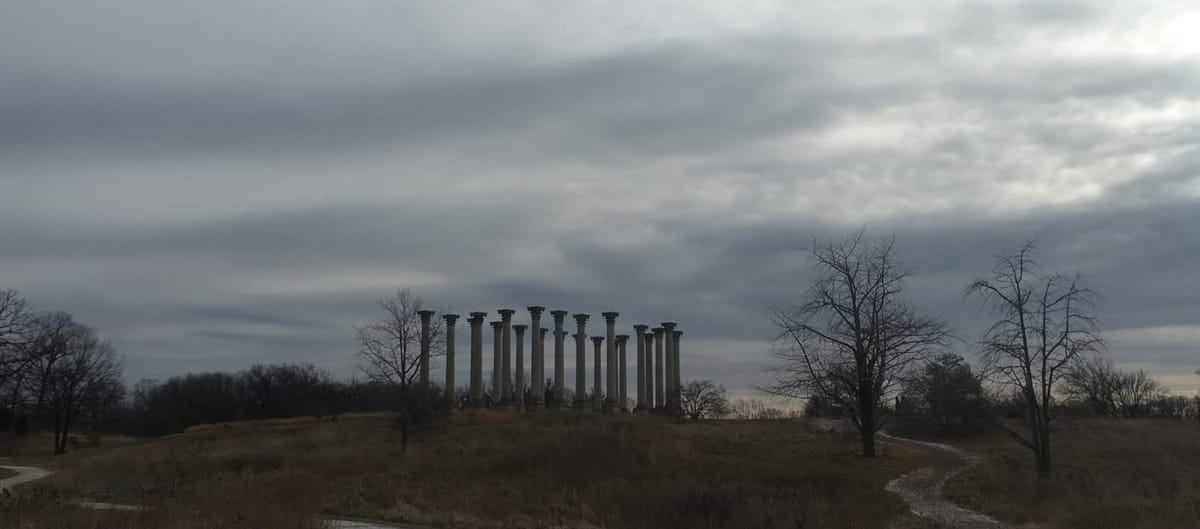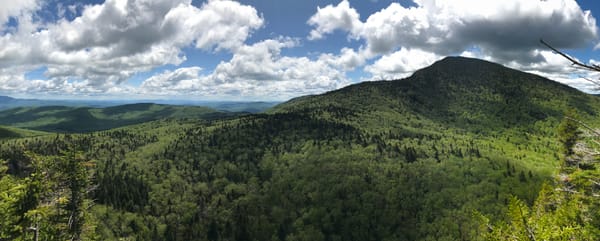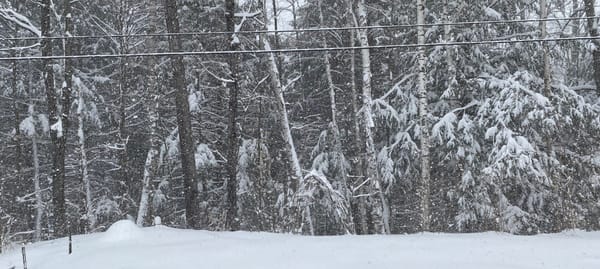Election Week
My understanding of the country I live in has collapsed in the past 12 hours. What now?

Tuesday 11/5
My Need to Understand
I am driven by a need to understand. We all are to some degree. We like when things make sense. And there are times when this need is particularly sharp and claustrophobic.
Most people who know me well would agree that I live in my head–in fact, I am so ‘in my own head’ that for a long time time I didn’t really understand what sort of people the phrase was meant to describe because why would it ever occur to me to categorize something reflexive to being in the world? I think that was me inadvertently illustrating the point.
If you’ve ever wondered what it feels like in here, it’s mainly me trying to understand things. Many people seek to understand things because it will lead them to productive solutions. Sadly, I’m not one of them. I want to understand things for two reasons: 1) Trying to understand is how I express my love for something. 2) Trying to understand is how I manage (mismanage?) my anxiety. When I decided I wanted to finish college, I became an expert on the admissions and transfer policies at the school where I hoped to enroll, as if it would help determine the outcome. It’s just what I do with things that make me anxious; I collect facts and figures and theories and stray trivia. I build it all into a sort of conceptual map in my mind, one which I can unfurl and observe from above, or wander through like a landscape. When people say I have a good memory sometimes I want to reply that it’s the byproduct of an elaborate self-soothing.
My understanding of the country I live in has collapsed in the past 12 hours. We re-elected him. I am part of a “we” that re-elected him. Elected him the first time, rejected him, and then elected him again. Because of, or despite, the hateful things he believes? This is what I am asking now. All the questions and theories about Joe Biden and the media environment and Democrats’ inability to communicate with the working class, those are questions about the seeds. I am saying I don’t understand what’s happening with the soil. And based on the returns tonight, the people I read and listen to in order to learn and understand what’s happening in this country are just as clueless as I am. I hope they are reckoning with that. I doubt many of them are.
How did we get this way? Has our economic security been eroded by technological transformation and an unfettered and rapacious financial sector wielding power and distorting incentives across the market? Are we atomizing, our communities dissolving, because an unregulated digital technology industry has installed itself as an agenda-setting, attention-degrading, rent-seeking cartel in the increasingly unseen nodes of our society? Has our sense of shared identity as Americans been worn down over two decades of increasingly disintegrated and algorithmic distribution of information and a public education system that hasgradually abandoned the humanities at every level? Perhaps. I do not understand.
50%+ of the American voting population is racist enough to excuse Donald Trump’s racism, misogynist enough to excuse his misogyny. Is that something I should want to attempt to understand? To accommodate myself to? Am I pragmatic, or lying to myself, if I try to reframe the proposition as something more palatable? Why? So I can feel soothed? By this?
I must give up understanding. I fear it will turn me into an irretrievable nihilist. It is not a viable pathway to meaning.
All this returns me to one of my central beliefs about writing: playful exploration yields better results, on the page and in my body, than self-serious demonstration. But the later I am awake the more I wonder if I’ve ever truly abided by this belief. Do I want to write because it’s fun and expressive, or because of this grandiose pressure that lives only in my imagination, which I could never have vocalized so precisely before tonight, to redeem humanity and myself with the sophistication of my understanding?
I don’t think anyone should be held accountable for their thoughts at 2:30 in the morning on November 6, 2024, but it occurs to me that, under the right circumstances, teaching high school might be a much more efficient route to filling my days with meaning than hoping that this compulsive drive to understand the world will someday bring answers that feel like enough. What is the connection here? I can feel it but the words aren’t there. It is getting very late in America tonight.
Wednesday 11/6
We Will Resist
Of course, we will resist. We will not fold. What these people want, they will have to try and take. Our books, our liberties, our rights, our neighbors. Us. We will not obey in advance.
Tonight at the Tunbridge General Store I heard a musician sing a rendition of that old John Denver song, “Country Roads”. “Country roads/take me home/to the place/I belong.” I cannot hear the chorus without remembering the summer of 2018, my final year at camp. I was 29 in my third consecutive summer supervising the rising 10th graders. One group of boys in the second half of the summer were the most difficult kids I have ever worked with. (Thinking of them today, some of the truly bad apples were forerunners for whatever brand of masculinity steered all these Gen Z men toward voting for Trump.) Other campers had to rely on other methods of drama and disruption to get attention. I could see how this dynamic had developed over the summers as these kids had met and grown up and coalesced into a community.
Walking to dinner on a particularly difficult day, I could sense the campers were simmering. After the meal came that old camp tradition–a song session, singing and clapping along with the guitar-wielding leader on a platform in the middle of the room. At the end of a good one, campers will chant, “One more song!”, calling for an encore.
On the night in question things were behind schedule and there wasn’t time. But my campers weren’t done. Around one of our tables, a group of my campers–not the shitty group–began to sing “Country Roads”, and by the end of the first chorus all of them were singing along as loud as they could. They sang that chorus over and over until one of the directors had me wrangle them out of the dining hall. For the rest of the summer when they felt like causing a ruckus, they’d burst back into song. May our resistance be one of powerful and joyous belonging.
Thursday 11/7
Naked and Shameless
We are handing the future of our country to a cadre of hyper-wealthy delusionals and narcissists whose ruthlessly self-interested cores are shabbily disguised by equally ugly layers of racism and conspiracy, dorm-room intellectualism and technophilic pseudoscience, soulless decadence and ostentatious wealth.
In the story of the emperor with no clothes, the dynamics are clear: the emperor is naked and deposed eventually by public laughter. Democracy is messier. There is no imperium, the power is the peoples’; if our votes weren’t secret, 70+ million Americans would be walking around naked this week. What I’m reading about the exit polls suggests that a not-insignificant portion of these folks don’t really know what they were voting for, only what they were trying to vote against. I understand that, intellectually if not emotionally, even though it makes the question of how we got here that much more complex and difficult to understand.
If we could all see who was naked, we’d at least be able to sort the ashamed from the shameless. From the gleeful. We would know for sure the number of people who ardently follow this evil, and someone who understands things in order to solve problems would eventually figure out how to get the rest of them to at least commit to sweatpants.
Friday 11/8
Shabbat
Tonight I streamed Shabbat services at my dad’s congregation down in D.C. I wanted to hear his sermon, and it did not disappoint. Hopefully the synagogue posts a video of it on Monday. I will send a link. There was a lot to chew on in there, about the media, about technology, about class and inequality and lack. It left me thinking that when it comes to resisting, this is something I understand in Jewish terms.
Sometimes Jewish resistance is a commonplace thing. We all do it, without realizing, to one extent or another. To be a Jew in America is to live in a counterculture, and to resist a normativity that would prefer we shed our differences. Never was this more apparent to me than the Christmas seasons I spent working at a toy store. We tend not to frame it this way, because assimilation is a sensitive topic among American Jews, but living as a Jew in a society that consistently and uncritically appropriates Christianity into its secular culture is a practice of resistance.
I think we will have to learn from this in the coming years. No matter what the fascists and theocrats are up to, we need to build our own thing. And what we build cannot, by definition, be framed by their norms, even in opposition. That would only be building onto their thing–like Menorah sweaters and other Chanukah approximations of Christmas ritual as a way of being Jewish in December (I offer this only as an illustration, I do not begrudge). We must build our own story of America in the 21st Century, and the progressive politics that goes with it, and it must be new and meaningful and welcoming and motivating and loving and hopeful. And it cannot glance constantly toward the edges of its sightline to adjust to whatever is happening on the other side. Jews didn’t change how Shabbat works when the Catholics enacted Vatican II.
In this spirit, I offer three brief ideas about how Jews resist:
Jewish resistance begins with humor. Laughter frees the spirit. Laughing at the absurd is a way of telling the truth. Laughing at the powerful is a way of claiming power.
Jewish resistance can move underground. We will do it in secret if we have to. We will hide our books. We will build gathering places concealed in the walls. We will remember all the stories. We will paint them on bricks and concrete in the night. We will sing at a whisper, and our song will tell the truth.
Jewish resistance does not end. If it comes to it, and they put me in a ghetto, I will fight. I will fight like my ancestors did. I will fight until no one can win. I will fight because it grinds the gears of their machine until someone else can pick up the fight. And they will keep at it until someone comes to save whoever is left, and our story will be told with the others when it all comes back around, and some future version of our side is called, once again, to resist.
On the Shabbat after the 2024 Election this does not feel like an overreaction, like wild speculation. We are in history now, whether we want to recognize it or not. Someday scholars will attempt to make sense of this era, and the bystanders will be labeled as such.
We must be honest and precise about what we are resisting. Precise because we cannot afford to alienate the bystanders rather than persuade them, and honest because we cannot afford to lure ourselves into complacency.
We will rise.



